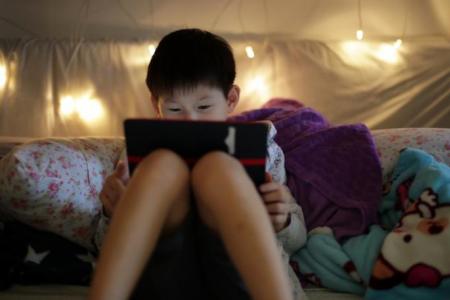Should I stop my child from befriending strangers on the Internet?
Protecting children from online harms can be a struggle for parents, especially those who lack knowledge of the latest games and apps.
Here are some common questions answered by a panel of professionals on Tuesday (Feb 8) at the Sunlight Alliance for Action's first webinar, which addressed parental concerns over online harms.
Q: Should I stop my child from befriending strangers on the Internet?
A: Encountering strangers online is almost inevitable when playing multi-player games, especially when one is not playing with friends.
Ms Joanne Wong, head of non-profit Touch Cyber Wellness, said: "We're not saying that you can't talk, but are you sharing key information that will lead them back to you?"
She said children are taught by the non-profit to filter what information they share. Touch Cyber Wellness holds school-based and community programmes to help young people, educators and parents interact healthily and responsibly with technology.
Ms Wong added: "We highlight that there are certain actions that make us very vulnerable."
She said: "For example, if you don't really want to handle strangers' requests... your accounts online should be private."
Q: How can I protect my child against pornography?
A: Associate Professor at the Singapore Institute of Technology Jiow Hee Jhee said: "Research shows that exposure to pornography helps inform sexist and unhealthy notions of sex and relationships."
Looking at pornography can also distort perceptions of sexuality, increase the risk of developing a negative body image and the risk of developing sexually compulsive behaviour, said Prof Jiow, who is a member of the Media Literacy Council and researches the impact of digital media on the family and cybercrime.
If parents discover that their child is watching pornography, they should be patient and take time to understand his or her motivations.
Two boys whom Prof Jiow had counselled came to the conclusion that it was better not to tell their parents about coming across pornography because they had not been given a chance to explain themselves, he said.
Professor Daniel Fung, chief executive of the Institute of Mental Health, recommended that parents should introduce the idea of what pornography is about to their child and explain why it is not good to watch such content.
Said Prof Fung: "It's a bit like teaching your children about safe sex. It doesn't mean that they will participate in sexual intercourse."
Q: How can I help my child deal with cyber bullies?
A: Children might find it difficult to articulate being bullied or they might think that admitting to being bullied is a sign of weakness, said Ms Wong.
Parents can remind children that there is the option of reporting and blocking someone who is harassing or bullying them, she noted. The bully will not know he or she has been blocked.
Ms Wong said: 'We've realised that we actually have to tell them that when you block someone, that harasser or bully who could be your friend will not be notified."
Q: How do I start talking to my child if I am not tech savvy?
A: Ms Wong recommended parents find out the kind of apps and platforms that children are using and learn how they work.
This will help parents when they speak to their children about the apps' usage and safe ways to do so, she said.
Q: What are some good practices I can put in place to help my child navigate the digital world?
A: Panellists said parents should be involved in their child's journey.
Prof Jiow said: "Sometimes the kid may stumble onto things that they don't know are problematic."
Apps to monitor and block offensive content can be used, he said, but as they grow older, children should be weaned off these apps in order to let them practice control and discernment.
Parents should also monitor online behaviour and screen time closely when children are young, said Prof Fung, so the youngsters do not get in trouble.
He said: "So as much as we want to demand that they follow your rules... if you haven't instilled this when they were young... don't try to incorporate too much when they're older."
Ms Clara Koh, head of public policy for Singapore and Asean at Meta, which owns Facebook and Instagram, said parents need to be aware of whether their children are accurately declaring their age on the platforms, because measures have been put in place to protect minors.
Facebook and Instagram are designed for people who are aged 13 and older.
Parents can also tap features on Instagram and Facebook to manage their children's activities, she said.
Get The New Paper on your phone with the free TNP app. Download from the Apple App Store or Google Play Store now


